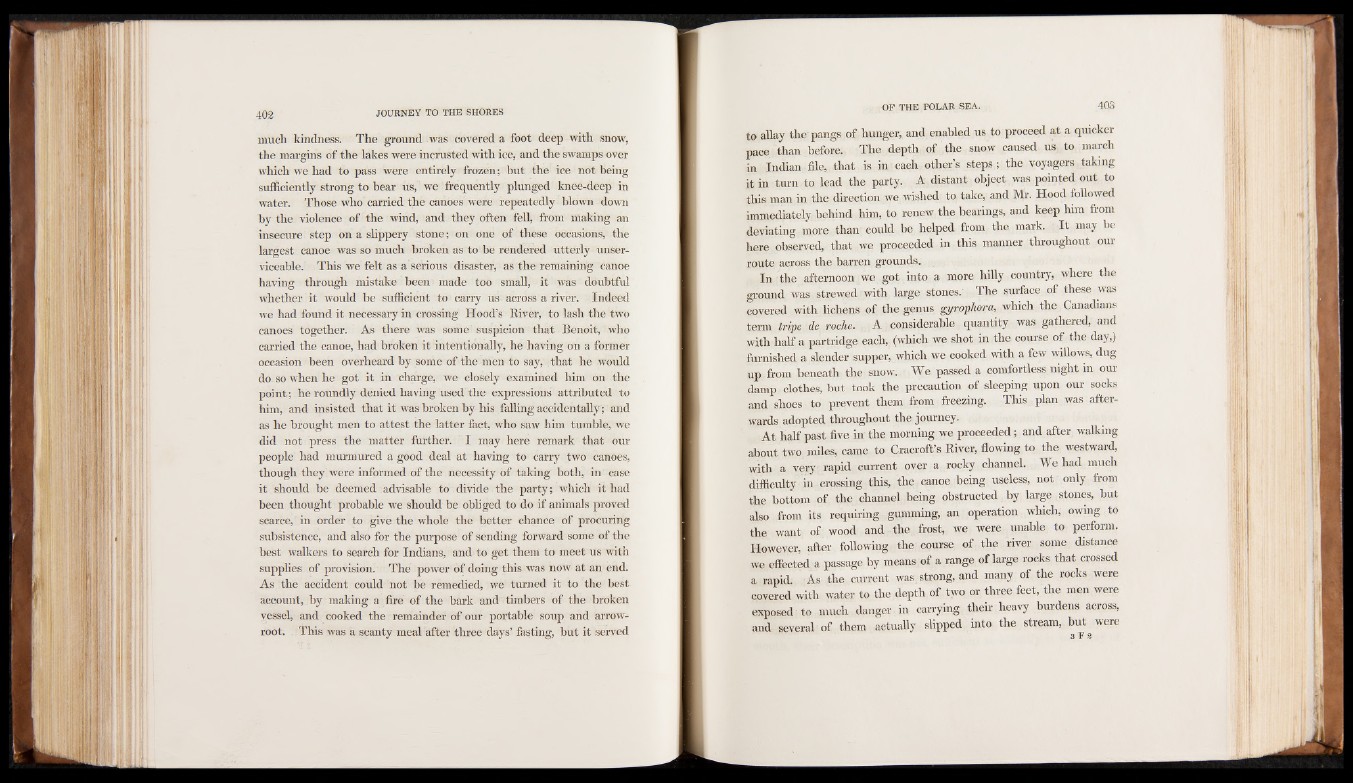
much kindness. The ground was covered a foot deep with snow,
the margins of the lakes were incrusted with ice, and the swamps over
which we had to pass were entirely frozen; but the ice not being
sufficiently strong to bear us, we frequently plunged knee-deep in
water. Those who carried the canoes were repeatedly blown down
by the violence of the wind, and they often fell, from making an
insecure step on a slippery stone; on one of these occasions, the
largest canoe was so much broken as to be rendered utterly unserviceable.
This we felt as a serious disaster, as the remaining canoe
having through mistake been made too small, it was doubtful
whether it would be sufficient to carry us across a river. Indeed
we had found it necessary in crossing Hood’s River, to lash the two
canoes together. As there was some suspicion that Benoit, who
carried the canoe, had broken it intentionally, he having on a former
occasion been overheard by some of the men to say, that he would
do so when he got it in charge, we closely examined him on the
point; he roundly denied having used the expressions attributed to
him, and insisted that it was broken by his falling accidentally; and
as he brought men to attest the latter fact, who saw him tumble, we
did not press the matter further. I may here remark that our
people had murmured a good deal at having to carry two canoes,
though they were informed of the necessity of taking both, in case
it should be deemed advisable to divide the party; which it had
been thought probable we should be obliged to do if animals proved
scarce, in order to give the whole the better chance of procuring
subsistence, and also for the purpose of sending forward some of the
best walkers to search for Indians, and to get them to meet us with
supplies of provision. The power of doing this was now at an end.
As the accident could not be remedied, we turned it to the best
account, by making a fire of the bark and timbers of the broken
vessel, and cooked the remainder of our portable soup and arrow-
root. This was a scanty meal after three days’ fasting, but it served
to allay the'pangs of hunger, and enabled us to proceed at a quicker
pace than before. The depth, of the snow caused us to march
in Indian file, that is in each other’s steps ; the voyagers taking
it in turn to lead the party. A distant object was pointed out to
this man in the direction we wished to take, and Mr. Hood followed
immediately behind him, to renew the bearings, and keep him from
deviating more than'could be helped from the mark. It may be
here observed, that we proceeded in this manner throughout our
route across the barren grounds.
In the afternoon we got into a more hilly country, where the
ground was strewed with large stones. The surface of these was
covered with lichens of the genus gyrophora, which the Canadians
term tripe de roche. A considerable quantity was gathered, and
with half a partridge each, (which we shot in the course of the day,)
furnished a slender supper, which we cooked with a few willows, dug
up from beneath the snow. We passed a comfortless night m our
damp clothes, but took the precaution of sleeping upon our socks
and shoes to prevent them from freezing. This plan was afterwards
adopted throughout the journey. •
At half past five in the morning we proceeded; and after walking
about two miles, came to Cracroft’s River, flowing to the westward,
with a very rapid current over a rocky channel. We had much
difficulty in crossing this, the canoe being useless, not only from
the bottom of the channel being obstructed by large stones, but
also from its requiring gumming, an operation which, owing to
the want of wood and the frost, we were unable to perform.
However, after following the course of the river some distance
we effected a passage by means of a range of large rocks that crossed
a rapid. As the current was strong, and many of the rocks were
covered with water to the depth of two or three feet, the men were
exposed to much danger in carrying their heavy burdens across,
and several of them actually slipped into the stream, but were
3 F 2